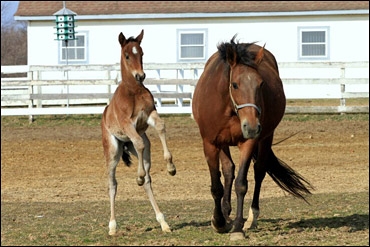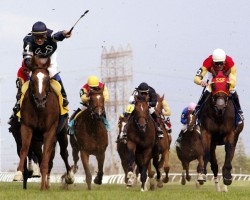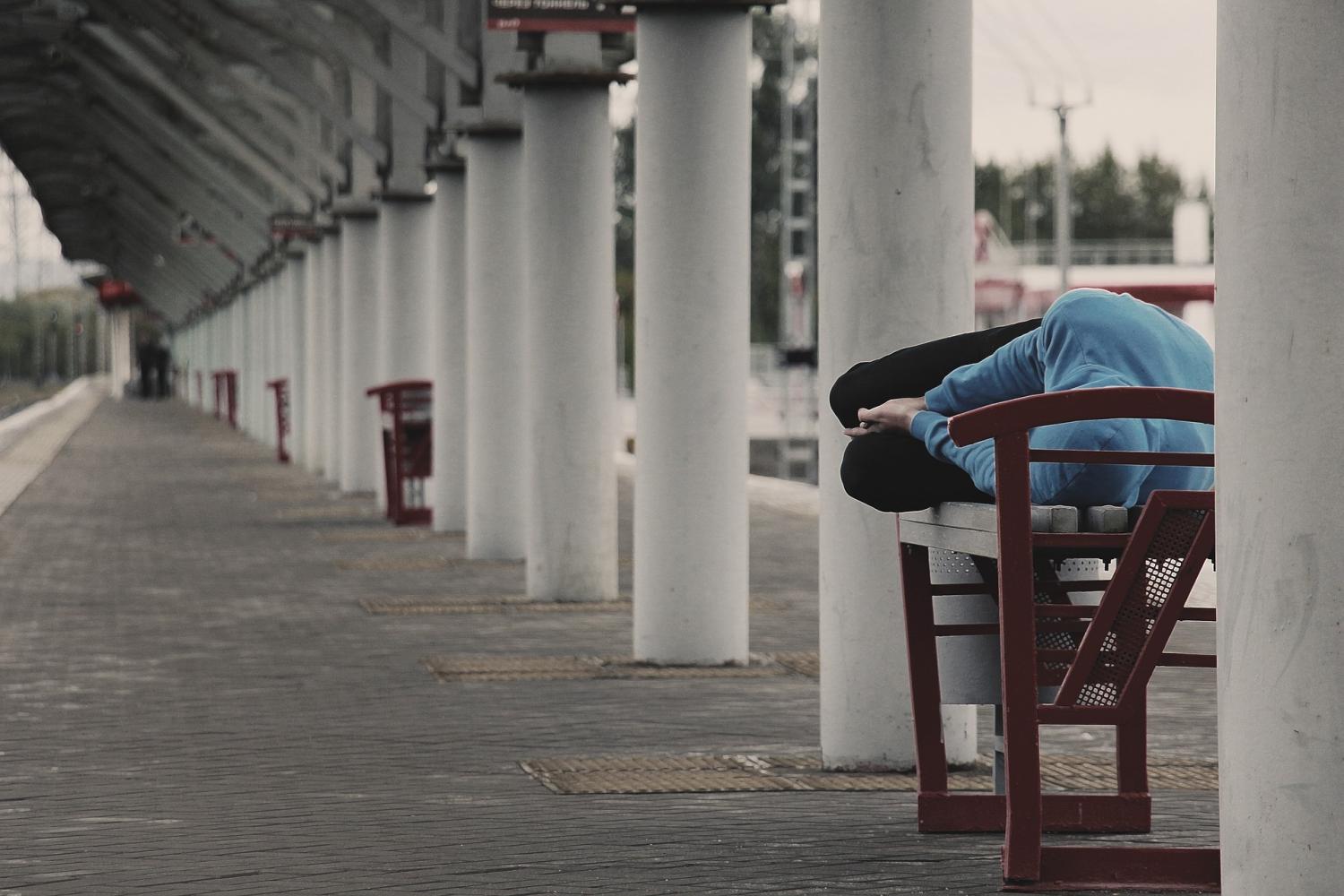
Part Three: Horse Sense & Government Nonsense
Public-Private Partnerships Are Not Subsidies
The Ontario government’s decision to end the Slots at Racetracks Program has a detrimental effect for Ontario’s vibrant horseracing and equine industries.
The McGuinty government’s decision to end the Slots at Racetracks Program has become a political football which has been kicked back and forth between the OLG, the Liberal government and the NDP (the Progressive Conservatives have been on the sidelines due to their decision to withhold support for the Ontario Budget even before it was announced), with no one party clearly wanting to deal with the consequences that ending the program would have for the province. The OLG’s play is summed up by their spokesman Tony Bitonti, who insists that “the implications for ending it fall into the camp of the government, since Slots at Racetracks is a government policy and we’re a Crown corporation, not a government body.”
The Liberal government’s play is to set up a straw man argument, presenting itself as making a tough but necessary choice between continuing to support the province’s health care and education systems or its horseracing industry, a clearly fictitious argument. Dwight Duncan’s spokesperson Aly Vitunski captures the government’s play by stating that “we are committed to the people in the industry, but there comes a point when it’s health care and education or horseracing. It’s unfortunate but we have to choose health care and education.” Health care and education on the one hand and horse racing on the other are not mutually exclusive. In fact, much of the McGuinty government’s 75 per cent share of the revenue generated from the Slots at Racetracks Program is allocated to providing generous support for health care and education in Ontario.
The example of one Ottawa-based racetrack demonstrates that the “either or” play used by the Liberal government does not stand up to scrutiny. Jean Larose, general manager of Ottawa’s Rideau Carleton Raceway, states that: “Since the Slots Program began, Rideau Carleton Raceway has generated $643 million for the provincial government that is specifically earmarked to be spent on health-care costs for all Ontarians. That represents the cost of nearly 80,000 hip replacements.”

It should also be noted that, on the issue of health care, the Ontario government has a less than sterling record. On Premier Dalton McGuinty and Finance Minister Dwight Duncan’s watch, eHealth squandered more than $1 billion in taxpayers’ money on the province’s failed initiative to create electronic health records for Ontarians. And, earlier this year, it came to light that Ornge, the province’s not-for-profit air ambulance provider, lost more than $200 million of taxpayers’ money through mismanagement. Allegations of unsound business practices and questionable invest-ments, some unrelated to running an air ambulance service, were compounded by the fact that the number of patients transported by Ornge was steadily declining. But the funding Ornge received from the Ontario government increased rather than decreased. The McGuinty government claims that Ontario must act now and choose between, as Aly Vitunski said, “health care and education or horseracing.” Yet, in the case of Ornge, the government was informed of alleged wrongdoing long before it was finally forced to act. One might wonder why the government is now moving so quickly to terminate a successful revenue-sharing program like the Slots at Racetracks Program when it was in no hurry to deal with the Ornge debacle.
Andrea Horwath, the leader of the Ontario New Democratic Party, delegated the NDP’s play in the Slots at Racetracks political football game to NDP MPP Taras Natyshak, who has been the party’s point man on this issue. Representing the riding of Essex which is closely tied to the horseracing industry, Natyshak stated that “the Ontario government’s decision is not a prudent move and is fiscally irresponsible.” (…) “The provincial NDP as a whole disagree with the Premier and the Ontario government’s decision.” However, actions speak louder than words. When asked what exactly this statement meant and why the NDP abstained rather than vote against the Budget if it so strongly disagreed with the government’s decision, Natyshak responded that, “because the modernization initiative was spearheaded by a government agency, OLG, it did not rear its head in the context of the Budget. No amendments within the Budget could have been made by us to specifically address the OLG modernization initiative since the details of the initiative were absent and they were the prerogative of the OLG.”
Andrea Horwath and the Ontario NDP were prepared to vote against the Budget over wages for unionized government workers but would not do the same for the province’s horseracing and equine industry because of the OLG modernization plan’s lack of clarity and detail. Instead, the NDP claim to have won a victory for Ontario’s horseracing and equine industry by having secured the $50 million funding for the Horse Racing Transition Panel.
However, many in the industry view the panel and its $50 million fund as little more than an economic band-aid and an attempt by the government (and also the NDP) to show that they care about the 55,000 non-unionized industry workers. In politics, per-ception is reality. Across the aisle, Liberal Minister McMeekin says: “We in agriculture had nothing to do with the OLG decision. We discovered it about the same time as everyone else did.” And so the political football continues to be passed.

Regardless of who assumes responsibility for ending the Slots Program, it is abundantly clear that the issue as a whole can be seen as symbolic of a predominantly urban-focused and urban-centric government being unable to understand a predominantly rural-based industry and way of life. As Dennis Mills puts it, “very few legislators understand how this industry works because most legislators are from cities” and they are unfamiliar with the horseracing and equine world. Ian Russell explains that many legislators who hail from Ontario’s cities have a preconceived notion that horseracing is a sport limited to Bay Street investment bankers and corporate lawyers who own and race thoroughbreds. This is not the case. “In fact, the majority of the tracks in Ontario race standardbred horses that are owned, trained, managed and raced by salt-of-the-earth, everyday Ontarians,” Russell says.
Many in the industry adamantly insist the government needs to realize it wrongly assumed that ending the Slots at Racetracks Program would adversely affect only the upper echelon of Canadian society. Or, as Anna Meyers explains, “the Ontario government needs to look at the whole province and not just the urban centres when it considers the implications for any decision it makes.” The argument could be made that this was not the case with its cancellation of the Slots at Racetracks Program.
Instead, the government suddenly and unilaterally ended a program that has allowed the horseracing and equine industry to thrive in Ontario. And, as Conservative Senator Bob Runciman points out, “a true cost-benefit analysis of ending the Slots at Racetracks Program has not yet been undertaken.” He goes on to state that the decision “doesn’t make any sense” because when a production line at an Oshawa automotive assembly plant is shut down with a loss of about 2,000 jobs, there is blanket coverage in the media. Yet, when the province’s entire horseracing and equine industry, accounting for some 55,000 jobs, is placed on life support by a hastily implemented government decision, there is very little coverage by the media.
The reasoning behind this event continues to defy logic. The McGuinty government’s past eHealth and Ornge boondoggles pale in comparison with the likely long-term loss of revenue and the number of Ontarians who will be forced to rely on unemployment or social welfare programs, given their industry-specific skills which are not easily transferable. The province’s unresearched and unpredictable decision to terminate the lucrative Slots at Racetracks Program will have lasting consequences. Senator Runciman sums this up by stating that “maybe the original contract and revenue-sharing agreement should have been updated or renegotiated, but to blindside everyone by unilaterally ending the program without even doing a cost-benefit analysis speaks volumes about the unpreparedness and hastiness of this government.”

The impact of that questionable decision will be felt by more than the 55,000 Ontario workers who are part of the horseracing and equine industry with its web of ancillary businesses. The province’s horse tracks are not just the workplaces of jockeys, trainers, and farriers – nor do they simply provide a venue for the leisure of gamblers and spectators. The tracks also serve as meeting places for people from all walks of life. For instance, Ottawa’s Rideau Carleton Raceway has been the home of the Gloucester Fair for the past 13 years. Every year, the Raceway hosts fundraising events for more than 100 charities and businesses, as well as the annual events of several embassies.
It is also worth noting that much of the revenue that has been raised from the 14-year-old Slots Program is being put to use outside the tracks themselves. The Rideau Carleton Raceway’s general manager Jean Larose explains that: “The Slots at Rideau Carleton Raceway generated $52 million for the City of Ottawa which the city has said helps keep annual municipal property tax increases lower.” Thus, even city dwellers will feel the impact of the Slot Program’s termination as more of the province’s horseracing tracks will be forced to call off all bets and close down. Ultimately, the termination of the Slots at Racetracks Program will be a great loss to Ontario and to Canada as a whole because as Dennis Mills notes, “there’s no other product in Canada that has the global sports presence and the tourism reach of horseracing in Ontario, but a lot of city people don’t know this.”
Many Ontarians who live in rural areas are well aware of the importance of the province’s horseracing industry, the third largest of its kind in North America. Dr. Garth Henry is one of those people. He has invested hundreds of thousands of dollars in building and operating his veterinary practice and horse training facility and is very conscious of the negative effect that cancellation of the Slots Program will have for his business and for his employees.
Dr. Henry states that when the program ends on March 31, 2013, “the Hamstan Farm’s training facility will be shut down overnight and the 13 people who work there will be unemployed immediately.” As will doubtless be the case for similar businesses in Ontario’s horseracing and equine industry, the future does not look rosy for the 100-acre Hamstan Farm. It will become the victim of an urban-centric government that is seeking to reduce its $15-billion deficit at the expense of the Slots at Racetracks Program.












